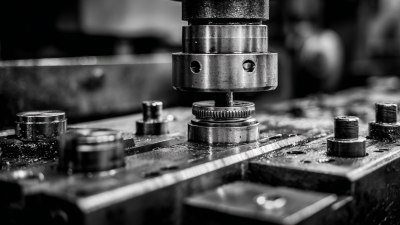Uncovering the Advantages of Industrial Machine Equipment in Enhancing Global Supply Chain Efficiency
In today's rapidly evolving global marketplace, the efficiency of supply chains has become a critical determinant of business success. With the increase in demand for faster and more reliable delivery of goods, companies are turning to advanced industrial machine equipment as a means to enhance their operations. According to a report by McKinsey, organizations that invest in state-of-the-art machinery can improve supply chain efficiency by up to 30%, significantly reducing lead times and operational costs. Additionally, a study published by the World Economic Forum highlights that the integration of smart industrial equipment can lead to a 25% increase in productivity. As businesses strive to meet the complexities of modern supply chains, leveraging industrial machine equipment is not just an option but a necessity for driving growth and competitive advantage.

Maximizing Productivity: How Industrial Machines Streamline Operations
In an era where global supply chains face unprecedented pressures, the integration of
industrial machine equipment
is proving to be a game changer. As reported by the International Federation of Robotics, organizations that adopt advanced automation technologies see a productivity increase of up to
30%. By streamlining processes—from manufacturing to logistics—industrial machines minimize human error and optimize workflow efficiency. This level of precision not only accelerates production rates
but also enhances the overall quality of products, reducing waste significantly.
Moreover, a study conducted by McKinsey & Company
highlights that companies leveraging industrial machinery can cut operational costs by as much as
20%. Automation allows businesses to respond swiftly to market demands, adapting their supply chains dynamically. With
real-time data analytics, organizations are equipped to foresee challenges and mitigate risks effectively. As the quest for efficiency intensifies globally, investing in industrial machine equipment is
not just an option; it’s a necessity for companies aiming to maintain a
competitive edge in their industries.
Reducing Downtime: The Role of Advanced Equipment in Supply Chains
In today's competitive market, reducing downtime is essential for improving supply chain efficiency. Advanced industrial machine equipment plays a pivotal role in this endeavor. By employing cutting-edge technology—such as predictive maintenance and real-time monitoring—companies can anticipate potential failures before they occur, minimizing unproductive time. Moreover, automation in manufacturing not only streamlines operations but also enhances overall productivity, allowing businesses to respond swiftly to market demands.
**Tip:** Invest in IoT-enabled equipment to gather data on machinery performance. This proactive approach enables timely interventions, ensuring that equipment runs smoothly and consistently.
In addition to predictive maintenance, the integration of advanced robotics can significantly reduce manual handling and the risk of human error. These machines work tirelessly alongside human operators, effectively increasing throughput without compromising safety. Such advancements create a more resilient supply chain, allowing companies to maintain a competitive edge.
**Tip:** Consider training your workforce to maximize the benefits of new technologies. Well-versed employees can better leverage advanced equipment, resulting in fewer disruptions and enhanced operational efficiency.
Uncovering the Advantages of Industrial Machine Equipment in Enhancing Global Supply Chain Efficiency
This chart illustrates the average downtime experienced by different types of industrial machine equipment in hours per month. Reducing downtime is crucial for enhancing supply chain efficiency, and advanced machinery can play a significant role in achieving this goal.
Cost Efficiency: Saving Money Through Automated Manufacturing Solutions
Automated manufacturing solutions are revolutionizing the way industries operate, especially in the context of global supply chains. One of the primary advantages of these advanced industrial machine equipment systems is their ability to significantly reduce operational costs. By streamlining production processes and minimizing human intervention, companies can lower labor costs and decrease the chances of errors that often lead to costly delays and wasted materials.
Furthermore, automated systems enhance production speed and efficiency, allowing businesses to respond more dynamically to market demands. This agility is crucial in today’s fast-paced economy, where consumer preferences can shift overnight. With the capability to operate around the clock, automated manufacturing not only boosts output but also ensures that companies can meet customer needs without incurring excessive overtime expenses or inventory costs. As businesses continue to embrace these automated solutions, the cost savings will further compound, making them an essential component of a competitive supply chain strategy.
Enhancing Flexibility: Adapting Supply Chain Strategies with Modern Machines
In today’s rapidly evolving market, enhancing flexibility in supply chain strategies is paramount for businesses seeking to stay competitive. Modern industrial machines play a crucial role in this adaptation process. By integrating advanced technologies such as automation, AI, and IoT, companies can streamline operations and respond to changing consumer demands more effectively. These machines not only improve production rates but also enable real-time data collection, allowing businesses to adjust their strategies dynamically.

Moreover, the incorporation of state-of-the-art machinery fosters greater customization and scalability. Businesses can easily pivot their production lines to accommodate varying product specifications or seasonal fluctuations in demand. This adaptability reduces lead times and minimizes wasted resources, significantly improving overall efficiency. As companies harness the power of industrial machine equipment, they not only enhance their operational agility but also build a more resilient supply chain that can weather uncertainties in the global market.
Driving Innovation: The Impact of Technology on Industrial Equipment Performance
In today's rapidly evolving industrial landscape, technology plays a crucial role in enhancing the performance of industrial equipment. Advanced technological innovations, such as IoT sensors, AI-driven analytics, and automation, are revolutionizing how equipment operates within the supply chain. These technologies not only improve the efficiency of machinery but also facilitate real-time monitoring and predictive maintenance, reducing downtime and operational costs significantly.
Moreover, the integration of smart technologies into industrial equipment fosters greater collaboration within the supply chain. Enhanced data analytics enable companies to optimize inventory management and streamline production processes. As a result, organizations can respond swiftly to market demands and minimize waste. The continuous drive for innovation encourages manufacturers to upgrade their machinery, ensuring that they stay competitive and maintain high productivity levels, thus enhancing overall supply chain efficiency on a global scale.




